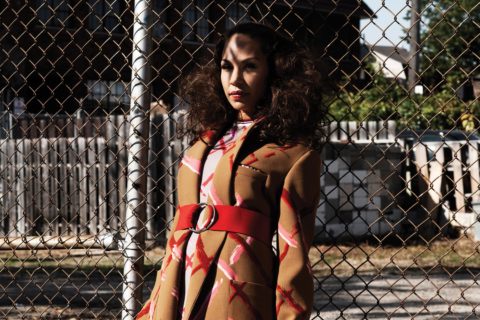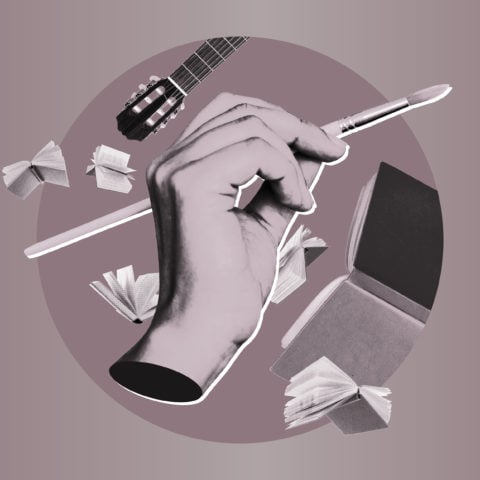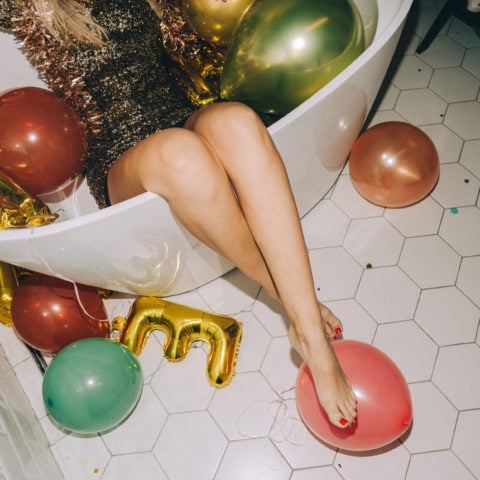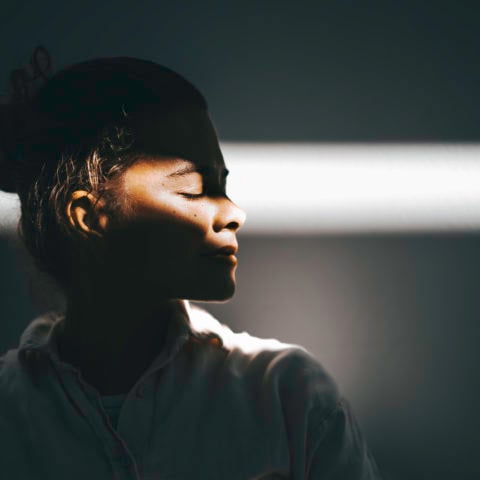Amanda Brugel of The Handmaid’s Tale and Room Talks Race and Identity
I couldn’t fathom race because I was blissfully unaware that humans categorize themselves by colour.
I was 11 years old when I found out that I’m black. Hold on. Half black. Or “mulatto,” as they used to say before the term matured into the clinical-sounding “biracial.” But I’m getting off track. Essentially, one summer afternoon, I came to learn that I had been adopted and was instantly given a crash course on the concept of race. You see, my mother is Caucasian, and my father is Southeast Asian and Jewish. When I was 11, my parents cautiously sat me down and informed me that I had been adopted by my dad, that a completely different man was my birth father and that this man was African-American. Wait! “What did you think you were?” is the question that usually interrupts this part of my tale. My answer, which more often baffles than informs, is always “Amanda. I thought I was Amanda.”
Up until that point, my family had never discussed race. To be honest, my parents hadn’t consciously avoided the topic as some sort of social experiment or new-wave-parenting methodology; it was just never a part of our family narrative. No two people in my immediate family are of the same race. I should repeat that. My mother, my sister (she’s half white, half Southeast Asian), my father and I all have different backgrounds.
And while you might assume that the presence of multiple nationalities and racial backgrounds would make us more sensitive to our separateness, it did the opposite and swiftly excused race from the conversation. I was cognizant of the fact that we each looked different, but I just assumed this was because we were special—or perhaps because I had been born in Montreal or even because our family had been to California once. I didn’t recognize our skin colours. I couldn’t fathom race because I was blissfully unaware that humans categorize themselves by colour. So, imagine my confusion on that summer afternoon.
I was cognizant of the fact that we each looked different, but I just assumed this was because we were special—or perhaps because I had been born in Montreal or even because our family had been to California once. I didn’t recognize our skin colours. I couldn’t fathom race because I was blissfully unaware that humans categorize themselves by colour.
The following months were…complicated. I quickly learned that it made most of society uncomfortable to live a “colour-blind” existence, so I felt immense pressure to secure a race. But it’s difficult to commission an identity at 11. Sometimes I felt Jewish or black—or neither. One afternoon, my father overheard me complaining that I had failed a math test because “my teacher hates black people.” He promptly decimated that theory. “You are not allowed to tell yourself this story,” he said. “Never blame a success or failure on the colour of your skin. You’re bad at math. Get better.”
While his words were initially devastating, they deeply impacted my young heart and have remained with me to this day. That was the last time I attributed my skin colour to a personal success or failure. It forced me to base my core identity on anything and everything but race. I didn’t choose a particular race. I stayed Amanda. And I continued this way until I decided to become an actor. And then it all went straight to hell.
I was 21 years old when I found out that the entertainment business viewed me solely as black. I also quickly learned that this business concludes that women of colour are either drug addicts or angry yet approachable slaves. I’m exaggerating; it also imagines us to be sassy detectives and sassy single mothers who work in sassy nail salons. For my first audition, I was asked to play Trixie, a heroin-addicted prostitute with a New York accent, and told that nudity would be required. For my second audition, I was to become a “red-lantern whore” with a southern accent. Nudity was once again required. My third, ninth, 18th and 25th auditions….well, you get the point. And for a couple of years, I gave it the old college try. I bought two pairs of pleather booty shorts, devoured books on slavery and honed my NYC accent. I leaned into every ugly stereotype created by our collective unconscious. And I was suffocating. Slowly.
I bought two pairs of pleather booty shorts, devoured books on slavery and honed my NYC accent. I leaned into every ugly stereotype created by our collective unconscious. And I was suffocating. Slowly.
One weekend, as I was preparing to audition for Gangsta Chick Number 3, my mother said, “This isn’t you.” “It’s the only stuff available to people who look like me,” I hissed. She replied: “You are Amanda first. Then, a woman. Then, biracial.” I slept on this, and when I was on my way out the door the next morning, something happened. My OG identity and limitless, unbridled 10-year-old sense of self reclaimed her parking space. I ditched the booty shorts for camo pants and delivered the audition in a cockney dialect.
I didn’t book that job. Or the next one. Or the one after that.
However, I did unwittingly start to develop a reputation for making “unique” choices. This, in turn, ultimately forced casting directors and producers to rely on me less and less to embody their version of a black woman. And slowly…painstakingly, I carved out a place for myself.
I’m proud to be biracial. I’m borderline arrogant about the complexity of my ancestry. I don’t want to live in any other skin.
Now, let me be crystal clear: I’m proud to be biracial. I’m borderline arrogant about the complexity of my ancestry. I don’t want to live in any other skin. However, it is the last thing I think about when I walk into a room. And not because I haven’t experienced devastating racism or witnessed someone clutch their stupid purse tighter or been asked if my pubic hair is an afro. When I enter a room, I consider myself a woman, a mother and an eccentric friend. The construct of race and I were finally introduced, and we didn’t get along. So I’ma do it my way and walk in as Amanda first.








